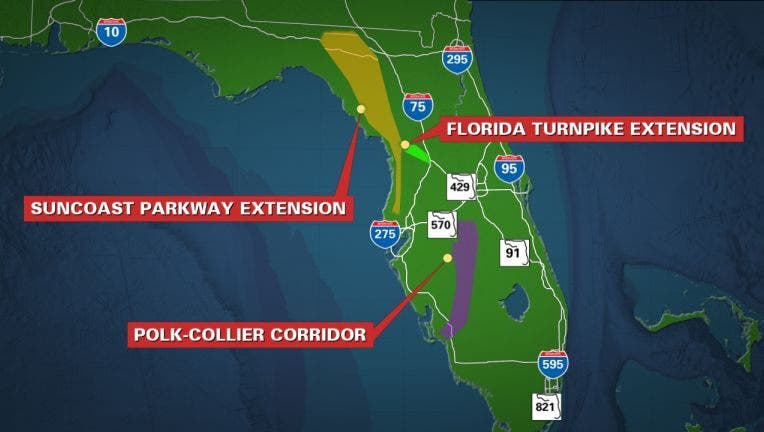Florida toll road recommendations draw mixed reactions

TALLAHASSEE, Fla. - Recommendations approved this week about controversial toll-road projects planned to run through rural areas of Florida drew mixed reactions from two environmental groups that participated in task forces that reviewed the projects.
Audubon Florida praised the efforts of the three-state task forces for protecting natural areas and rural lands “from what could have been a disaster.”
“In effect, the task force recommendations have directed DOT (the Department of Transportation) to use rigorous criteria in considering any road expansions, declared that there is not any immediate need for these corridors, and rejected the rush to build projects that seemed to fuel the original 2019 legislation,” Audubon Florida Director of Advocacy Charles Lee said in a prepared statement late Thursday.
Meanwhile, 1000 Friends of Florida declared in a letter to Department of Transportation Secretary Kevin Thibault that the task force reports fail to address measures to keep the roads from fueling urban sprawl in rural areas.
The projects would extend the Suncoast Parkway from Citrus County to Jefferson County near the Georgia border, extend Florida’s Turnpike from Wildwood to connect with the Suncoast Parkway, and create a new road linking Polk and Collier counties.
“The failure to protect natural resources and rural communities from the impacts of sprawl leaves the distinct impression that one of the purposes of these highways is to spur new residential development in rural areas, and that purpose is not found anywhere in the M-CORES statute,” said the letter from 1000 Friends, referring to a 2019 law that began work on the projects formally known as Multi-use Corridors of Regional Economic Significance, or M-CORES.
The letter was signed by 1000 Friends Chairwoman Susan Trevarthen, President Paul Owens, board member Andrew Dickman and past policy and planning director Thomas Hawkins. It noted they support language in the reports demanding that economic feasibility and traffic data be obtained indicating a need for the roads before advancing engineering studies.
But the organization wanted it known the reports water down or fail to provide adequate safeguards for resources of statewide significance, such as drinking water, in leaving land acquisition at interchanges as a local government issue.
“At the end of the day, we think the directives in the report fall short of the mandate in the statute --- and our bottom line --- to protect the environment and revitalize rural communities,” the letter said.
Owens, Dickman and Hawkins each served on one of the three task forces.
State lawmakers last year approved moving forward with the roads, with legislation eventually dedicating up to $101.7 million a year for the projects. But lawmakers also created the task forces to study and make recommendations.
The reports are due to Gov. Ron DeSantis and the Legislature on Nov. 15.
When drafts of the reports were released three weeks ago, Senate President Bill Galvano implied that halting the projects he’s pushed for nearly two years could hinder economic prosperity and technological advances in rural communities, as the roads would bring “wide-ranging infrastructure improvements” from water and sewer to broadband.
Among the recommendations for the projects, the task forces proposed the Department of Transportation first consider improving or expanding existing roads or co-locating the corridors within or adjacent to existing roads or along power line rights-of-way.
Also, the recommendations call for the proposed work to avoid conservation lands and incorporate wildlife crossings and call for reconsidering a deadline to begin work by 2023.
Environmental and financial feasibility studies are planned in the next phases of the road program. The state department requires a transportation corridor to be environmentally and financially feasible to be built.
The task forces were each comprised of about 40 people, including local officials, environmentalists, representatives of agricultural interests, transportation planners, members of business groups, and educators.
Support for the roads has come from groups such as the Florida Chamber of Commerce, Associated Industries of Florida, the Florida Ports Council, and the Florida Trucking Association.
Proponents say the roads would prepare the state for future growth and aid in disaster evacuations.

